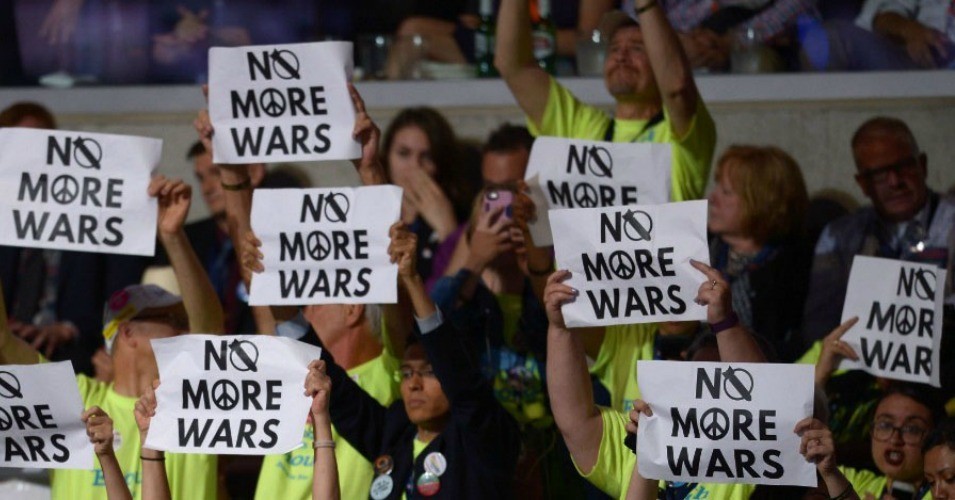
By Stephanie Rugoff
From Common Dreams | Original Article
We Are Not Your Soldiers brings exposure of imperial wars to a generation of youth largely unaware of the crimes being carried out throughout the world in their names.
On this Veterans Day, 2019, for the United States, making war is less about amassing human air, land and sea forces to attack “the enemy” as it is increasingly about amassing technological superiority in which machines replace humans enabling politicians and corporate bosses to pursue their goals without the pesky problem of waves of homeward-bound body bags and caskets.
Yet, the Pentagon was confronted with the obstacle of conscience being applied to technological research in mid-2018 when Google employees protested working on Project Maven, a program that would use artificial intelligence to assist in drone killing, causing Google to drop Maven. Tech workers at Amazon and Microsoft have also protested working on technology that supports repression and killing.
While work on Maven has been picked up by another firm and Amazon and Microsoft leadership have apparently felt free to ignore the pleas of their workers these protests illustrate the increasing power of individuals to throw monkey wrenches into the gears of the war machine.
Hence, the increasing importance of the task of educating all students on the consequences of war, whether or not they plan to join the military.
This is what We Are Not Your Soldiers has been doing for 13 years by bringing veterans into classrooms. Being knowledgeable of the realities of fighting in or, by inertia, supporting the wrong side of imperialist wars can lead to people speaking and acting in opposition to them.
Veterans Dialogue With Students About U.S. Wars
During 2018-19, all We Are Not Your Soldiers visits were in New York State, including:
- Four colleges in New York City
- Seven NYC high schools – from very traditional to very non-traditional
- A progressive NYC public middle school
- A NY State church social action program whose members are primarily immigrant youth
Speaking to:
- 17 college classes
- 41 high school classes (including one JROTC class)
- Four middle school classes
- One church youth group
… averaging out to deep discussions with approximately 1,600-1,700 students.
A teacher from one of the schools messaged us: “Just wanted to thank you again for spending a truly engaging, thought-provoking day with us. The work you do is incredibly vital for young people like my students, all of whom were enthusiastic, moved and grateful in their responses when I asked them for their thoughts on your visit in class the next day. I’m constantly trying to raise consciousness (and consciences…), but it is often a tough uphill trek, so I’m happy to have your help in the mission. I would love to have you back next year to meet a new batch of students! In the meantime, please keep doing the work you’re doing — I know how exhausting it is but I promise you it is worth it!”
Our Speakers
Miles Megaciph, a spoken word artist, tells the story of his time in the Marines, in Guantanamo and Okinawa, via hip-hop. Lyle Rubin, who served as a Marine lieutenant, focuses on several key incidents during his time in Afghanistan. John Burns, a former Army bomb technician, enlisted to save lives not to be turned into a robot. Will Griffin, a veteran of both Iraq and Afghanistan, was just elected to the board of About Face (formerly Iraq Veterans Against the War).
If Vietnam is being studied, Joe Urgo, an Air Force Vietnam veteran who had been a principal organizer of the Winter Soldier Investigation, speaks. Bruce Dancis, a Vietnam resister who spent 19 months in federal prison, also speaks.
Our messages
The veterans share their own personal stories of how they were affected by their time in the military, bringing another vision of these wars in which so many have been sacrificed by losing their lives and/or their humanity. And, they address the effects on the peoples of the countries under attack and what has happened when social structures have been destroyed. Not many veterans can do this.
Speaking openly of such experiences is very difficult and can open raw wounds – which is why even those students with veterans in their family or close circles have not heard much of what comes out in these discussions. Many veterans confront either denial or shame in revealing information contrary to the beliefs of those who “thank them for their service,” an issue for so many dealing with post-traumatic stress.
We are very grateful to these speakers who share their lives. They struggle to do this in order to help others avoid the trauma they have suffered and to avoid the horrific violence being aimed at so many others around the world.
We Are Not Your Soldiers brings this exposure of imperial wars to a generation of youth largely unaware of the crimes being carried out throughout the world in their names. As awareness and activism grows among young people around the climate crisis, immigration, racism, gun violence and the Trump administration, we show the connections between these issues and U.S. wars.
We emphasize students don’t have to believe us any more than they have to believe media advertising or the recruiters who approach them. They need to investigate on their own, researching conflicting claims to be able to get a true grasp on reality. Students ask questions and state their own opinions and thoughts. As a retired teacher with long-term experience in the New York City school system, I work with educators to align the presentation with their curriculum and be as relevant as possible to the needs of their students.
One student wrote: “Thank you for coming to our school. I appreciate that you shared your experience with us. It opened my eyes about the military because I didn’t know any of the stuff you shared with us. Your story made me realize how cruel the military can be. Also, you’re brave and kind-hearted for thinking about other people’s lives.”
Sometimes, we show students “Collateral Murder,” footage released by Chelsea Manning via Wikileaks of the US helicopter killing of Reuters journalists and others in Baghdad, or excerpts from “Unmanned,” a feature film about the moral quandary of a drone pilot stationed in the United States. After watching “Collateral Murder” students in a JROTC class asked, “Why did they kill children?” “Why did they talk about people in Iraq in such a messed up way?”
Morality is a key word or core idea we always introduce for students to consider throughout the presentation and discussion – knowing the difference between right and wrong and what to do when you know that something is wrong.
Coming to your school
If you are an educator, a student or a parent, invite us to your school. If you are a parent or simply a concerned citizen, approach local principals, guidance counselors or teachers about the importance of their students hearing all sides of the story so they can make wise decisions of what to do upon graduation. We encourage you to visit our website and follow our Facebook page.
We offer the We Are Not Your Soldiers presentations free of charge. Your donations keep us going.
We are scheduling visits for our We Are Not Your Soldiers tour for the fall 2019 semester. Call us at 646-807-3259 or email wearenotyoursoldiers@worldcantwait.net. We will arrange to be at your school no matter where you are located — we can do “distance” visits via Skype or Zoom.
Stephanie Rugoff, a former literacy specialist in the NYC public schools, coordinates the We Are Not Your Soldiers project.
